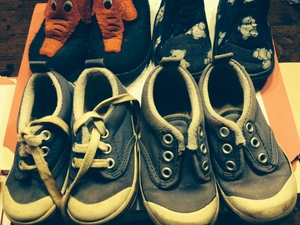"What I would give for a pair of your old shoes," Mama to Des
"I don't think I had em..." Des to Mama
Moving out of a home that I have lived in for 10 years brings back so many memories especially since I have kids. I found my sons' outfits that they were wearing when I first met them abroad when I adopted them. I saved these clothes on the very top shelf in the closet of their room. When we moved last week, I packed them in my backpack and brought them to my new home so that I could keep them close and show them to the boys any time they wanted to see them.
I took them out the first week we were in the apartment, and they smiled and started making baby voices. I was so happy to see them enjoy the only real evidence of their past life in their home countries. My oldest son has some vague memories of his first six years in Ethiopia, and I hold those memories that he shared with me when he first learned English in 2004. My youngest son was a four-month-old infant at the time of his adoption and he has no memories of his first months of life. He has paperwork which states his circumstances of abandonment in Hanoi.
In the early years of Ben's life in the U.S., I saved his baby shoes; I kept them in my office reminding me of the miracle of growth and development for Ben and other babies who I cared for in my pediatric practice. Des came at six-years-old with flip flops. I saved all of his drawings and important school projects, and we have those to admire now. And I have thousands of photos of both boys in actual albums along with files of photos in iPhoto on my computer.
What does this have to do with the work of Worldwide Orphans? Memories are key to attachment and security. Children love memories from day to day... actually from moment to moment. They think about what they did minutes and hours before and after an experience. They repetitively relive moments from storybooks that are read to them; they remember everything and practice those memories. They catch you when you try and skip a page. Ha! Families laugh at the kitchen table about the silliest memories. Des remembered that he urinated on his father's face when his father changed his diaper in Ethiopia. We loved this very universal memory when he shared it in limited English. We connect through memories. Private family memories can sustain relationships and secure the attachment that is so important for growth of healthy connections as one grows up.
Orphans have memories of family if they are older when they are relinquished or abandoned at an older age, but babies only have the memories of institutionalization and those memories can be sad and random. These memories are not used to strengthen bonds with caregivers or to create inner peace and security. There is very little fun or play in an orphanage, or on the street or in a refugee camp. Most kids don't recall experience from moment to moment in these settings, but they could if they were reminded or taught about how significant memories can be for good health.
It might be a very important part of our psycho-social programming for Worldwide Orphans to focus on daily memories through storytelling and play. We could do this easily with our Toy Libraries, Camp, Sport and Global Arts programs. Why not identify the memories and keep records of them for the children and have the children focused on the memories so that they can go back to them and draw upon them emotionally? Journals containing writing, drawings and photos could easily be part of the daily routine for orphans.
When I was in Haiti last week, we had a recreation activity and the kids wrote skits and acted the stories out with puppets. This kind of activity could easily draw on memories... it likely does already, but it is not identified or named as that.
Let's identify memories and name them in a Memory Project for all the orphans we serve around the world.
